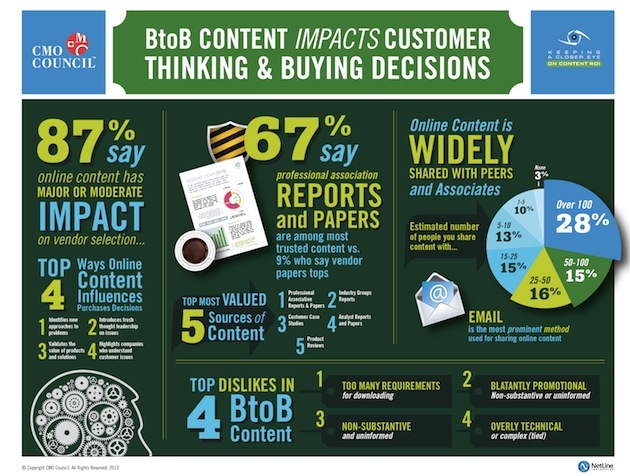What is the biggest challenge in B2B Content Marketing?
Creating content that our customers actually want to consume. That’s one of the key findings of a report from the CMO Council on B2B Content Marketing.
 In partnership with the Netline Corporation, the CMO Council surveyed 400 B2B buyers and content seekers around the world. Their responses show that content has never been more important to the buying process and yet vendors are falling far short in creating the kind of content that buyers are looking for.
In partnership with the Netline Corporation, the CMO Council surveyed 400 B2B buyers and content seekers around the world. Their responses show that content has never been more important to the buying process and yet vendors are falling far short in creating the kind of content that buyers are looking for.
The report found that B2B Content Marketing now represents a significant portion of the marketing budget. That includes the development, delivery and promotion of content to drive business leads, influence customer markets and grow the brand.
Yet, despite the increased focus, most companies still need to focus on the basics of content strategy, process and best practices for effective content marketing. The report claims that ‘too many organizations are still engaged in random acts of content development, without having implemented cohesive and effective strategies, customer-centric themes and platforms, efficient publishing and delivery capabilities, or the necessary content performance tracking systems.”
And this is causing marketing dollars to be wasted as B2B buyers are running from overly-promotional content that doesn’t meet their needs. Where are they going? To more relevant and trustworthy content producers.
The main findings of the report include:
- 25% of marketing budgets spent on content development, delivery and promotion
- 87% of buyers say online content has a major or moderate impact on vendor preference and selection
- 9% of respondents considered vendor content trustworthy vs. 67% who trust research from professional associations, 50% from industry organizations, 48% from customer case studies (48 percent), 44% from analyst reports (44 percent) and 40% from independent product reviews.
- The most important characteristics of valuable content are the breadth and depth of the information (47%), ease of access, understanding and readability (44%) and originality of thinking and ideas (39%).
- The biggest content turn offs include too many requirements for download (cited by 50%) and blatantly self-promotional content (43%).
Key takeaways:
- Content must be part of an integrated marketing communications plan.
- It must create value for the audience by connecting with customer needs and wants
- Effective content utilizes a multi-channel, multi-format approach
Maybe this is another classic case of a survey telling us what we already know. But sometimes having these data points helps to convince the boss that it’s time for a change.
[source: CMO Council on B2B Content Marketing]
